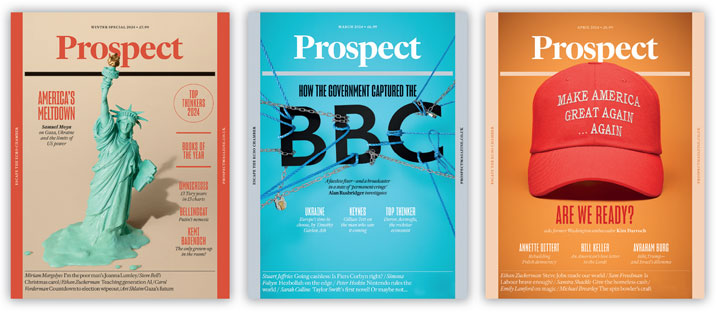
When Alan Rusbridger was editor of The Guardian, the co-founder of Prospect magazine, former Conservative MP Derek Coombs, tried to persuade him that the Guardian should invest in the high end, monthly current affairs magazine.
Rusbridger was scarcely against long form, thoughtful, analytical journalism. Far from it, but he was not convinced of the business case for such a magazine and the answer was an emphatic rejection.
It is just as well that Prospect, Coombs and fellow co-founder and first editor David Goodhart, found a way eventually to ensure that the magazine survived.
Indeed, in the end, Prospect was able to do a lot more than merely survive, after it was bought by the Resolution Foundation, an independent social and economic research organisation set up by the British businessman and philanthropist, Sir Clive Cowdery.
This is just as well as the properly funded magazine turned out to be the perfect base for Rusbridger’s second coming as a journalist – as editor of Prospect.
After twenty years editing The Guardian, Rusbridger first became president of Lady Margaret Hall, the Oxford University college, because he wanted to get completely out of news and get the very concept out of his system.
He liked working with young people, although it was very different from being an editor, having to negotiate his way through a college governing body 56 strong.
“I am glad that I had the training of dealing with the Guardian NUJ chapel. It was very relevant,” Rusbridger notes wryly.
The escape from news turned out to be less than permanent.
“I got a call out of the blue from Clive Cowdery asking, would I come in for a chat,” says the former Guardian editor.
Cowdery, who has made two fortunes in insurance, offered Rusbridger the Prospect editorship on the spot – in succession to another former Guardian journalist Tom Clark.
Investigating BBC governance
In the March edition, you can see the impact, not just of Rusbridger the editor, but after many, many years, the re-emergence of Rusbridger the reporter.
The cover story was headlined: How The Government Captured The BBC, with a feisty sub-head that read: A faceless fixer – and a broadcaster in a state of ‘permanent cringe’.
Then there is the intriguing by-line, “Alan Rusbridger investigates”.
The former Guardian editor had been reading The Plot by Nadine Dorries, a book alleging that there had been a deep state plot to unseat her hero, Boris Johnson. Most of the allegations were unsourced, and although they might well be true, it would be very difficult to prove either way. Then Rusbridger spotted on page 81 an accusation that was quite specific, and first hand.
The allegation was that Sir Robbie Gibb, a former Downing Street communications chief, and now non-executive director of the BBC, had been involved in trying to fix the chairmanship of media regulator Ofcom.
Dorries went further and alleged that someone in Downing Street had altered her recommendation that Lord Michael Grade should be the next chairman of Ofcom, which turned out to be the ultimate outcome.
Instead, Dorries claims, someone changed the name of her recommendation to that of a Downing Street fixer – Stephen Gilbert – Lord Gilbert.
“Why did they want to put Gilbert in charge of Ofcom and why did Boris Johnson want to fix the chair of the BBC and the chair of Ofcom? I think these are really significant stories which loads of people I think are asleep on,” Rusbridger argues.
“I think people were shrugging about all the skulduggery, about the BBC and regulation as though it were normal. It’s not normal and maybe you need someone who is a bit older who says, hold on a moment,” adds Rusbridger who is 70.
He says he has been particularly “staggered” by what he describes as “the routine brushoff statements” he has received from the BBC.
In the absence of proper responses from those involved, Rusbridger says he has concluded that the allegations of Nadine Dorries in this case must be true.
“I reported that story myself. It was a bit of investigative journalism. It was fun to get back to reporting. Reporting turns out to be enjoyable. It’s a long time since I’ve done it,” he says.
Next up, pieces on GB News, the right-wing television channel, and one of its financial backers, Paul Marshall, “who clearly wants to be a player on the right of British politics”.
Prospect’s prospects
Prospect has around 32,000 subscribers and another 10,000 or so would put it into the safety zone. Yet with stories like the BBC pieces, the digital hits can get into the hundreds of thousands.
One of Rusbridger’s main tasks now, with the help of a modest marketing campaign, is to try and raise the profile of the magazine, particularly in the US.
“The trick we pulled off at The Guardian was the Australian and American expansion to turn The Guardian into a global brand which has succeeded in spades. If we could get Prospect on the radar of the American reading public, that would be great,” says Rusbridger.
When he became editor in 2021, Prospect had a name recognition of 6 per cent. No new research has been done but Rusbridger guesses it could now be 15 per cent and says he is doing his best on social media to raise its profile.
“One of the things I have to do is build the brand and the awareness of it,” he explains.
While the heart of Prospect is formed by long, thoughtful reads that often challenge conventional thinking in a magazine that has writers from the left and the right and doesn’t reside in any camp.
There are also daily online digital pieces and Rusbridger podcasts, Media Confidential, shared with former Financial Times Editor Lionel Barber.
There have also been what Rusbridger sees as quintessential Prospect pieces such as Jonathan Powell, who helped negotiate the Good Friday peace agreement in Northern Ireland, on how the war in Ukraine will inevitably have to end – with talks. Latest Prospect pieces include 5,000 words from Lord Kim Darroch, former British ambassador to the US, asking whether the West is ready for a second Donald Trump administration and Annette Dittert reporting from Poland on how you rebuild a democracy.

Transformation at The Guardian
When he looks back at his long Guardian editorship, Rusbridger sounds very content at what was achieved. There were the huge stories such as the Wikileaks and Snowden revelations.
Yet, above all, Rusbridger emphasises how The Guardian managed the digital transformation, which took it from a newspaper with around 300,000 circulation to 150 million worldwide.
“All that was navigated, although I say it myself, skilfully,” notes Rusbridger who went on to write ‘Breaking News: The Remaking of Journalism and Why It Matters Now’.
The former Guardian editor says he was surprised that no-one had written a history of communications for the crucial 20-year period when traditional media overlapped “with this incredible revolution from techniques that had existed for 250 years to what we have today.”
He thought it important to write down what the period was like to live though.
“It is terribly easy with hindsight to think it was all obvious but it really wasn’t,” he says now.
The inevitable move from print to digital, at least in newspapers, will continue although the timing is far from clear.
“The dailies will go first (into digital only), then the Sundays and I don’t know about magazines,” he says.
While Private Eye goes from strength to strength in print, Condé Naste, he suggests, “might tell a different story”.
Overseeing Facebook
Rusbridger works four days a week at Prospect but his one-day-a-week job is equally interesting.
He is a member of Facebook’s 22-strong international Oversight Board set up to try to tackle some of the worst abuses of social media.
The dilemmas are obvious. On the one hand, Rusbridger believes in social media and that the idea of everyone having a voice is a good one.
Then there are the phenomena that the Oversight Board has to deal with – everything from online harm, hate speech and the limits of political speech to blasphemy, nudity and violent speech.
With a billion pieces of content being published every day, there are limits to what the Oversight Board can do with its capacity to take on perhaps 50 cases a year, other than set precedents that can ripple through the company.
“I think having control of the world’s speech in the hands of one person, Mark Zuckerberg, is a bad idea. Having it in control of a company that is broadly run by engineers is a bad idea,” says Rusbridger.
He adds: “So, I think that having 22 people who have thought about these issues is a good idea.”
The Oversight Board has the power to take stuff down and put stuff up but most of all, it can make recommendations that are difficult to ignore.
“We are definitely having an effect,” says Rusbridger citing the fact that there had been no moderating of content in Urdu. Now there is. By contrast a lack of expertise in Arabic had resulted in the over-moderation of content in Arabic that had amounted to a form of censorship.
Back home, Rusbridger believes that in the UK, the level of debate had shrunk and narrowed as the present government has run out of stream complete with “an ugly debate undertaken by people on the right fringes of the party”.
Alan Rusbridger believes that a new government coming in with a fresh programme and fresh ideas, almost regardless of which government it is, will change the media and the debate.
“I think the quite narrow range of voices that have dominated British media for a decade will change and I think that is good,” the Prospect editor concludes.
Might such a new, very different, government even offer him a top media job such as the chairmanship of Ofcom?
Unlikely. Oxford taught him that at heart, he is a journalist and reminded him of “this delight” in reporting and digging out stories.
“It’s the best fun. I am very happy doing what I am doing,” insists Alan Rusbridger.
This article was first published in InPublishing magazine. If you would like to be added to the free mailing list to receive the magazine, please register here.












